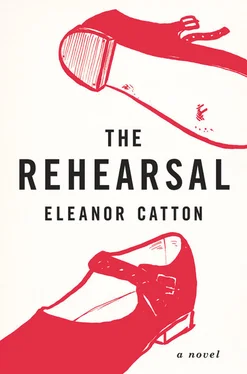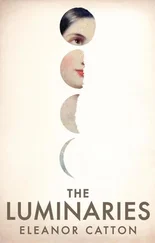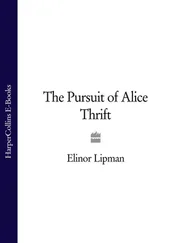Felix is still looking thoroughly confused. “On the bright side,” he says, trying hard to reclaim the situation, “you’re absolutely unrecognizable in your costume and everything. If that’s what you’re worried about. With the parents.”
“Yeah,” Stanley says. Underneath his makeup his jaw is set and his eyes are red and his face is pale, but in the mirror the pouting caricature that is Stanley’s reflection twitches his head and even seems to smile.
Saturday
Isolde and her parents are already on stage when the lights come up, Isolde on the far end of the settee and leaning still further outward, over the arm, every inch of her body craning away from the other two figures on stage: a stout mustached father and a bony mother who buttons all the way to the top.
“What you need to understand,” Isolde’s mother says, “is that this little taste of what could be is inside you now. You’ve swallowed it up, like candy from a brown paper bag.”
“What you need to understand,” Isolde’s father says, “is now that we know about it, it won’t happen anymore.”
“Remember that the only difference between you and any of the others,” Isolde’s mother says, “is at what price, and under what circumstances, you are prepared to yield.”
Stanley and his father enter, through the frosted French doors in the middle of the false backdrop, preceded by Victoria who has her palm out like she is showing the way.
“He’s here,” she says unnecessarily, making more of the line than she ought to, because it is her only one and she wants to be seen. The mother makes a flapping motion with her hand and Victoria exits, walking with the pursed self-conscious walk of an actor who has too small a part and so has practiced a single move to excess.
The group stand stationary for a moment, Stanley and Isolde looking at each other with an intense smoldering glare that is lost to everyone in the upper circle and in the restricted-viewing sections of the stalls.
Then Isolde’s father says stiffly, “I was just about to say, now that we’re here, let’s sort this out in a civilized way, like adults. But just as it was on the tip of my tongue I realized that the word adults wasn’t entirely appropriate, given the circumstances.”
There is a silence. Stanley’s father is the first to sit down.
Saturday
“The purpose of this recital,” the saxophone teacher says, “is really to let the students speak for themselves, as it were. It is really just a vehicle to let them voice their own growth, their own awakening, lay it bare like a virgin at an altar for all of you to see. While you are watching tonight, a good question to ask yourselves might be, What is this performance telling me about the performer? What naked shape emerges out of the rarefying mist of this girl’s music? What private things are being offered, and what private things are being betrayed?”
Julia is sitting in the second row with her sax held loosely on her lap, waiting for her cue to rise and take the stage.
“I mention this,” the saxophone teacher is saying, “because my next student has had a very difficult year. Many things have happened to complicate this girl’s life this year, and if we are very lucky we will see some of these tragic and beautiful things reflected in her performance tonight. Through her misery, every note she plays for you will become a lyric, and she will conjure up much more than a sense of longing and of loss. If we are very lucky, and this is my hope, then we will be able to see the vast extent of the hardship she has endured this year: we will see the unspeakable incest of two women together, played out before us like a rare recording stolen from a vault. You will have to listen carefully.”
Julia’s palms are cold and sweaty, and she wipes them roughly on the knees of her trousers.
“And just before I welcome Julia to the stage,” the saxophone teacher says, “can I just thank all the mothers here tonight for allowing me the strange satisfaction that is got by saying something that nobody hears.”
October
“You didn’t say he had the main part, Issie,” Isolde’s father says. He points to the program. “Look, his name’s right at the top.”
“He hasn’t told me anything,” Isolde says. “He even said don’t bother coming. I guess he was nervous.” She is looking up at the stage, tense with vicarious pre-show nerves. The lights are on in the orchestra pit and she can see the musicians emerging from the hidden half-door in the wall to take their places in front of their instruments. As they sit down they disappear from Isolde’s view.
“Queen of Spades,” Isolde’s father reads out loud, and then takes his reading glasses off and says “What about this, eh?” and elbows Isolde in a jovial sort of way.
“Maybe we shouldn’t have come on opening night,” Isolde’s mother says, tucking her knees sideways to let a young couple pass. “If he’s nervous.”
“I told you, he doesn’t know I’m coming tonight anyway,” Isolde says. She is craning around to look at the crowd. She watches a throng of senior students from the Institute flood into a wedge of seating in the rear of the stalls and suddenly feels foolish that she has brought her parents with her. The acting students are all clasping each other and hugging and gesticulating madly as they talk amongst themselves. Isolde imagines pushing her way backstage to surprise Stanley at the end of the night, knocking on his dressing-room door and waving shyly as she stands on the threshold with the actors shrieking and shouting up and down the corridor behind her, and all at once she suffers a horrible feeling of dread.
“We don’t have to go backstage,” she says out loud, to reassure herself. “I can just call him tomorrow.”
She hasn’t spoken to Stanley since the fight on the side of the road.
“Isn’t it posh,” Isolde’s father says. “Look at that plasterwork on the arch. That’s a beautiful job.”
The band starts up and the house lights begin to fade.
“I wish I’d got some mints now,” Isolde’s mum says. “I hope there’s a half-time.”
October
“It’s always—and only—vicarious,” the Head of Movement is saying, drumming his fingers impatiently on the glossy cover of the program that is lying on his knee. The cover shows a caricatured girl in pigtails and a school uniform, and the title of the play: The Bedpost Queen. The Head of Acting is craning around to look out over the crowd, and isn’t really listening, but the Head of Movement is speaking with a strange tight urgency that cannot wait for an audience, and anyway the words are mostly for himself. He says, “You never get around that aspect. Even at your most effective, your most vivacious and inspirational, you’re always just… looking on.”
September
“Do you know something?” Stanley’s father says, leaning down the couch toward Isolde. She turns her head, so they are profiled there against the cream: her delicate upturned pout, his sunken cheek and lantern jaw.
“When I do a group therapy session,” Stanley’s father says, “for my work—say if I have six or seven or more clients in a room, maybe a whole family if that’s what I’m working on—my policy at first is to say absolutely nothing. I ask questions, invite people to speak, bring up issues, but I say nothing about what I think. I don’t even hint. I do this for the first session, and the second.
“By the end of the second everyone’s itching. They want to know who this guy is, this psychologist who only listens, sits and listens and sometimes asks a question, always a mild question, never provocative, never acute. I cost too much, I’m too well known, just to listen. They become wary of me. They bicker among themselves and then look sideways, daring me to act.
Читать дальше












